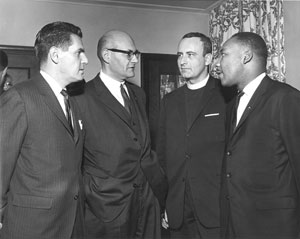With the recent death of former Ontario Provincial Court justice Sydney Harris, the province’s legal community lost a vehement backer of human rights and civil liberties.

Harris, 91, was best known for his work on the bench, most notably acquitting the gay magazine Body Politic and members of the Pink Triangle Press in 1978 for possession and distribution of obscene materials. In 1983, he dismissed charges against Paul Magder Furs for selling goods on Sunday. He convicted NHLer Dino Ciccarelli for an on-ice assault in 1988.
Ontario Surveyor General Brian Maloney, who worked with Harris from 1995 to 2001 on the council of the Association of Ontario Land Surveyors, remembers him as a very thoughtful person.
“I can tell you, when he gave us advice, we listened,” says Maloney. “He was not one of these guys that would stand up and make a lot of noise; a fairly quiet individual. But when he did have something to say, it was worth listening to, I can tell you that.”
Toronto lawyer Daniel Kayfetz remembers a fateful day in 1970 when he came upon Harris on the street shortly after graduating law school. Harris offered to let him use office space.
“He said, ‘Well listen, I’ve got an empty office up here at my place,’” recalls Kayfetz. “He said, ‘Why don’t you come up here, and start practising law. Don’t worry about what it costs, just come up and start and we’ll work something out.’”
They eventually agreed on $50 a month, but Kayfetz says the free mentorship Harris provided was the real steal. He recalls that during the time he spent working alongside him, Harris spent more than half his time doing charity work.
“He had a very strong need to help community and deal in civil rights,” says Kayfetz.
“He was a man who was precise and careful; he didn’t speak unless he knew what he was talking about,” says Kayfetz. “He was very well read, and he read all of the time, everything.”
Harris was born in Toronto in 1917, and attended the University of Toronto and Osgoode Hall Law School. He went on to practise with Harold Rubenstein until 1976, when he was appointed to the Ontario Provincial Court (Criminal Division).
Although he retired from the provincial court bench in 1992, Harris went on to act as a Small Claims Court judge, a referee of the Law Society of Upper Canada, part-time member of the Ontario Assessment Review Board, and a lay appointee of the council for the AOLS.
“I can’t recall any time that he gave us an opinion or advice that we didn’t value,” says Maloney. “You knew he had thought things through. He was a solid thinker, there’s no question about that. And I think his motives were always pure. You could tell he wouldn’t just bring a perspective forward as a lawyer. . . . It was always a very honest, fair type of opinion.”
Kayfetz says Harris was passionate about work.
“He wanted to keep giving his time,” he says. “I’m sure it wasn’t for financial reasons, he just wanted to give his talents and he was a good decision-maker. He wanted to provide his talents as long as he could.”
Harris also made significant contributions to the Jewish community throughout his life. He served as the national president of the Canadian Jewish Congress from 1974 to 1977, and also acted as president of the Canadian Council of Reform Congregations.
He advocated, among other things, for religious education, the expansion of civil liberties and human rights, and the abolition of capital punishment. During the 1950s and 1960s, Harris actively supported the U.S. civil rights campaign, meeting Martin Luther King Jr. in 1963.
Harris died Jan. 17 at his home, surrounded by his family. He is survived by wife Enid, sons Mark and David, grandchildren Lindsay and Brett, and sister Thelma.

 Harris, 91, was best known for his work on the bench, most notably acquitting the gay magazine Body Politic and members of the Pink Triangle Press in 1978 for possession and distribution of obscene materials. In 1983, he dismissed charges against Paul Magder Furs for selling goods on Sunday. He convicted NHLer Dino Ciccarelli for an on-ice assault in 1988.
Harris, 91, was best known for his work on the bench, most notably acquitting the gay magazine Body Politic and members of the Pink Triangle Press in 1978 for possession and distribution of obscene materials. In 1983, he dismissed charges against Paul Magder Furs for selling goods on Sunday. He convicted NHLer Dino Ciccarelli for an on-ice assault in 1988.